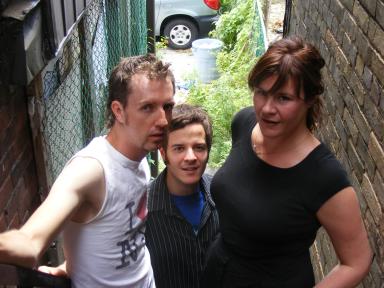Crush - oh no, not again

For the second review in a row I have to issue a spoiler warning (ironically, for similar reasons). So, if you’re seeing Crush stop reading, immediately.
We’re in small city in Ontario, we’re in a trailer park. It’s the mid-nineties but it might as well be the mid-eighties. Crush is a coming out play and yes, depressingly, the gay guy must die. Twice I’ve had to endure this in one afternoon here in Toronto. What on earth is going on? I don’t doubt the sincerity of these playwrights but really, what is going on?
Ronny (Ryan Kelly), who is out, is killed by Martin (Julian DeZotti) who is undergoing a sexual identity-crisis and, of course, has to kill the object of his desire. I mean, how else are you going to resolve this sort of inner torment if you live in a trailer park in a small Ontario city in the mid-90’s? Therapy? I don’t think so. The play doesn’t build inexorably to the murder and I suppose that is sort of the point, you never know who might be a murderer, who might be experiencing a sexual-identity crisis. Personally, I think Hume Baugh, the playwright, wrote himself into a corner and felt something had to happen. Sadly, he chose murder. An exploration of the inner workings of someone who kills through sexual confusion could be very powerful. This is not what Crush explores.
At the top of the show, Martin is a sort of male ingénue. His arrival in the trailer park provides the catalyst for the story, his physical presence the energy the other two feed off. Both Sandra (Siobhan Power) and Ronny in turns try to seduce him. Sandra’s technique (for want of a better term) is forthright and DeZotti plays the baffled awkwardness well. He appears to be someone surprised by his sexual effect on others. Ronny, despite his aggressiveness in other parts of his life, is more subtle in his seductive overtures and ultimately more effective (although with tragic consequences, this being a trailer park in a small Ontario city in the 90’s).
So, up until the murder, Crush feels sort of like a Canadian white trash Tennessee Williams, exploring sweaty frustration and desire in the trailer park. It hasn’t got the poetry but it does have a few laugh out loud lines (including “I fucked you to see if you were human or not”). The acting is very good, especially by Power who is extremely effective as the “hag-fag” best friend of Ronny. She closes the piece, alone, with a lovely monologue to the television. For his part, Kelly plays the most unlikely gay I have ever seen on stage: no dress sense and god-awful hair – it thoroughly undermines notions of gaydom (which is one of the most welcome twists in this production). This playing with perceptions is further pushed when Ronny teaches Martin lessons in how to be a “Mary”, which is ironic because Ronny is further from being a Mary than I am (and no one calls me a Mary, understand?).
So what we have are three reasonably interesting characters, caught in a love triangle (Martin, the pig, sleeps with both Ronny and Sandra) but it’s as if Baugh didn’t know what to do next. Clearly, Martin should be at the centre of the piece – although at the moment it feels more like it's Sandra – and it could have been an exciting exploration of love, desire and confusion. There’s even a point where Ronny and Martin begin to form a recognizable relationship and I found myself going “wow, what a strange yet compelling couple, I wonder what will happen next?” You already know.
Another problem is that it feels like a movie-script. There are way too many scenes – and this is especially noticeable on a tiny stage where the poor actors have to trump back and forth, moving pieces of unnecessary furniture around. The numerous scene changes disrupt the flow and take us out of what we should be focusing on: the actors and the story. Really, all they need is the omnipresent television and the cans of beer. Oh, and they can leave the knife out as well.
Crush by Hume Baugh; Directed by Mark Cassidy; Presented by Optic Heart Theatre; Featuring Julian DeZotti, Ryan Kelly, and Siobhan Power. Part of the 2008 SummerWorks Festival. For more info, park yourself here.



